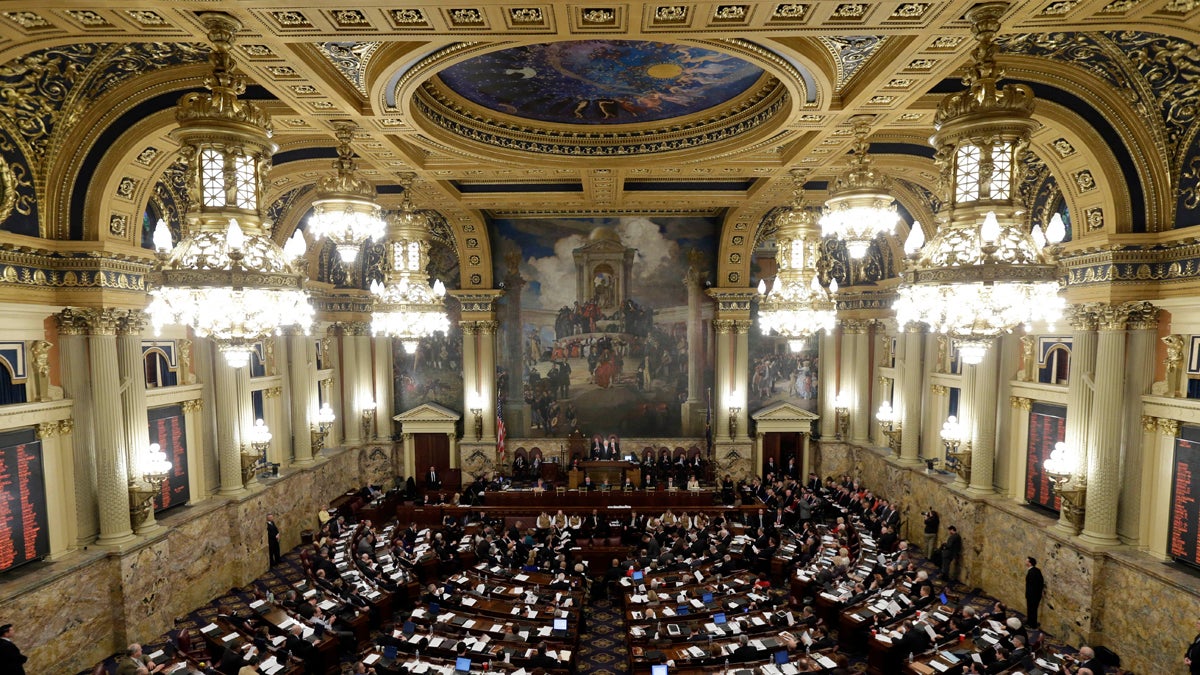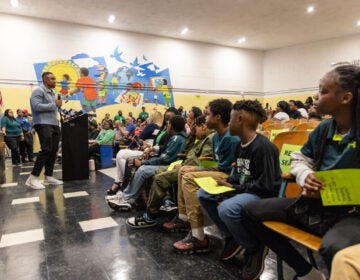More uncertainty over Philly school funding with millions stalled in Harrisburg

Pa. Gov. Tom Corbett is shown delivering an early version of the state budget to a joint session of the state House and Senate on Tuesday, Feb. 5, 2013, in Harrisburg. (AP Photo/Matt Rourke, file)
Pennsylvania Gov. Tom Corbett urged state lawmakers Wednesday to pass a stalled bill that provides an extra $45 million for Philadelphia’s cash-strapped schools under certain conditions.
“Legislative leaders need to resolve their differences and act responsibly to send the [bill] to my desk for approval,” Corbett said in a statement.
The General Assembly’s Republican leaders do not oppose the schools funding, which is a tiny piece of a large budget-related bill called the “fiscal code.”
The disagreement is over language that the House inserted into the bill at the eleventh hour, which would have have pushed for payday lending in the state. The Senate erased that language Wednesday, so now the bill must head back to the House for approval.
The problem? The House has recessed. Its next scheduled voting session isn’t until September.
Charles Zogby, Corbett’s budget secretary, said that waiting is not an option.
“If left to languish, it will … impact our ability to further fund Philadelphia schools,” he said.
Senate Majority Leader Dominic Pileggi (R-Delaware) said he expects the House to return and pass the bill.
Senate Republican spokesman Erik Arneson added in an email, “I haven’t heard anything to indicate that 45 million won’t still be available even if they don’t return before September.”
House GOP spokesman Stephen Miskin said leaders are looking into whether there will be any ramifications if members delay a vote until the fall.
Sharon Ward, executive director of the liberal-leaning Pennsylvania Budget and Policy Center, said the state cannot function without the budget-related bill that includes schools funding.
“I would think they would want to resolve it quickly,” she said. “They’re not going to put this off until September. It would be unprecedented.”
The $45 million in state money originates from an apparent settlement with the federal government. However, Pileggi suggested that was not a done deal.
“The administration hopes to have [the funding] available based on negotiations with the federal government, which, my understanding is, have not yet concluded,” Pileggi said.
Corbett’s office did not respond to a request for comment on the status of the agreement.
Senate passes sales tax legislation
The GOP-led Senate passed another piece of Corbett’s Philly schools package Wednesday, which would let the city extend a 1 percent sales tax that would have expired in 2014.
The legislation, which is a small piece of an overall tax bill, now heads to Corbett’s desk.
State officials assume that the district will be able to borrow $50 million for 2013-14 against the future sales tax revenue. In upcoming years, the tax is expected to generate up to $120 million annually for the district.
Corbett’s funding package also boosts the Philadelphia school district’s basic education subsidy by about $2 million compared to his February budget. And it assumes that the schools will receive $30 million from improved local tax collections.
That adds up to about $127 million in extra city and state aid that district officials were not already counting on. That is $53 million less than what the district asked for in order to avert layoffs and deep cuts to programs.
The Philadelphia school district, which is also asking for $133 million in labor concessions, has not commented on whether it is important to have the one-time shot of $45 million immediately available so it could restore some layoffs.
That money is contingent on the Pennsylvania education secretary determining that the district has put into effect “reforms that provide for fiscal stability, educational improvement and operational control.”
The School Reform Commission did not publicly oppose adding the contingency language to the agreement.
The earlier that laid-off teachers and other district employees are called back to work, the less chaotic it would be to open schools in September.
The school district is asking the teachers’ union to accept tiered salary cuts and extra contributions for health care. It also wants to base pay raises on “performance” rather than longevity and level of education, and virtually eliminate the use of seniority for determining where teachers are assigned.
Philadelphia Federation of Teachers president Jerry Jordan said the “strings” attached to the additional funding do not affect collective bargaining. Jordan has argued that the district is is demanding too much from teachers to balance its budget, and not enough from the city and state government.
Also on Wednesday, the local government watchdog group Committee of Seventy called for City Council to hold a special summer session to work with Mayor Michael Nutter to find more local aid for the schools. The group said the city should consider cutting its budget to free up funding.
Councilman Jim Kenney said lawmakers will keep working together to avert a crisis when schools open in September.
“After what happened in Harrisburg sinks in … we will have continued conversations with the Council President and with the mayor’s office and with whoever else is interested to see what can be done,” Kenney said.
City Council President Darrell Clarke’s office declined to comment on the Committee of Seventy’s statement.
Additional reporting by Mary Wilson.
WHYY is your source for fact-based, in-depth journalism and information. As a nonprofit organization, we rely on financial support from readers like you. Please give today.




